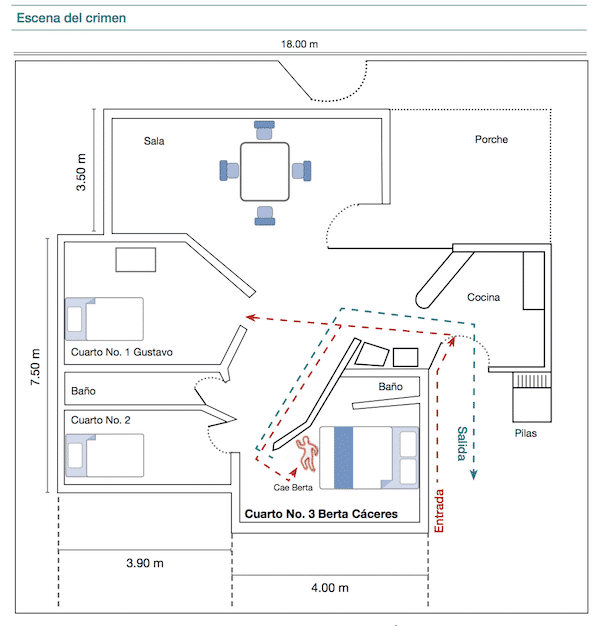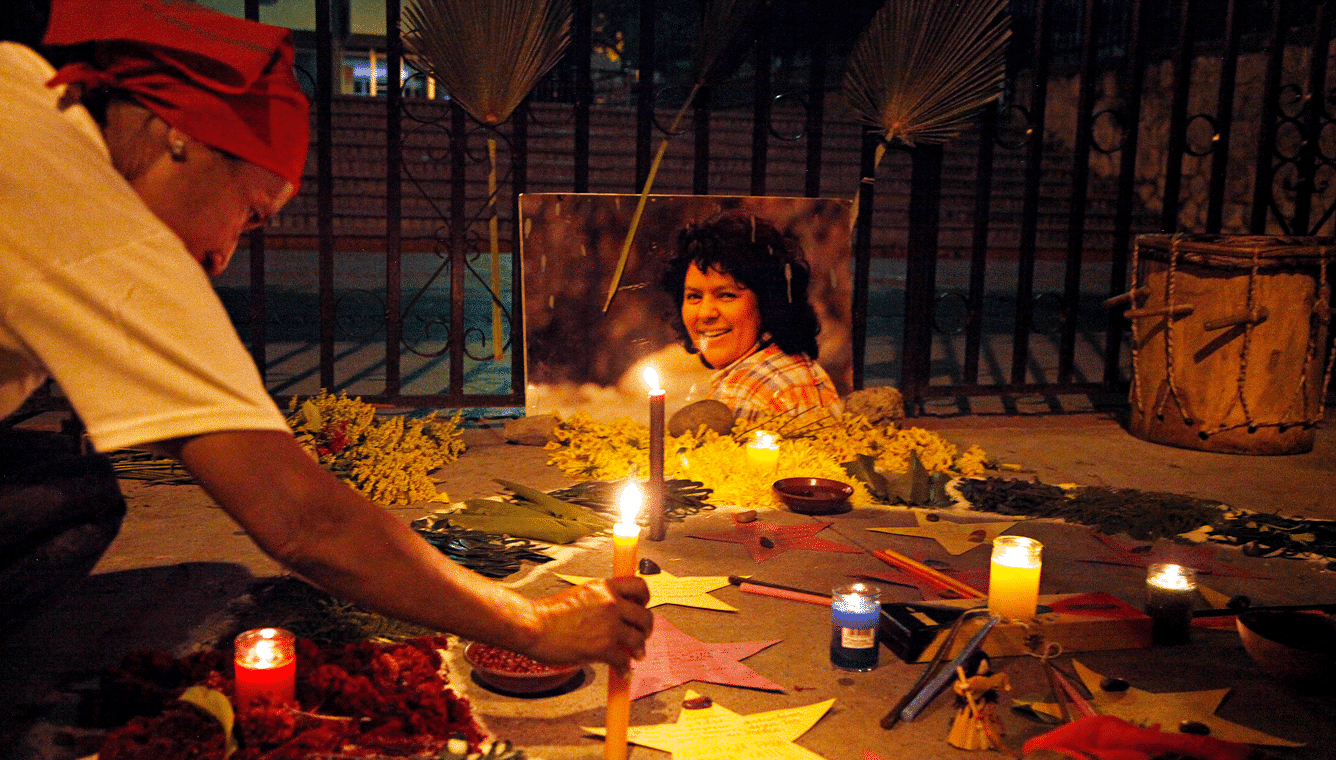Authorities in Honduras found seven of the eight men accused in the high-profile murder of renowned environmental activist Berta Cáceres guilty, a welcomed step forward, but justice was only partially served.
Prosecutors found seven of the defendants, Sergio Ramón Rodríguez, an engineer for Desarrollos Energéticos SA (DESA); Douglas Geovanny Bustillo, DESA’s former head of security and a retired military officer; Mariano Díaz Chávez, a former soldier who served with Bustillo; Henry Javier Hernández, a former Honduran soldier who served with Díaz; Edwin Rápalo, former Honduran soldier Edilson Duarte Meza, and Oscar Torres guilty of Cáceres’ murder, the Attorney General’s Office announced November 29.
The eighth defendant, Emerson Duarte Meza, was found not guilty due to insufficient evidence against him and released. Hernández, Rápalo, Edilson Duarte and Torres were found guilty of the attempted murder of Mexican environmentalist Gustavo Castro.
The verdict comes more than two years after armed gunmen burst into Cáceres’ home in La Esperanza in southwest Honduras on March 2, 2016, killing her and wounding Castro, who survived only because he played dead.

(Graphic showing Cáceres’ murder scene c/o International Expert Advisory Panel report)
In 2015, Cáceres, who founded the Civic Council of Popular and Indigenous Organizations of Honduras (Consejo Cívico de Organizaciones Populares e Indígenas de Honduras – COPINH), was awarded the prestigious Goldman Environmental Prize for her activism.
Cáceres’ staunch opposition to the construction of the Agua Zarca hydroelectric dam managed by DESA, which threatened to jeopardize indigenous Lenca communities living along the Gualcarque River that they consider sacred, is believed to be what ultimately led to her murder.
Authorities in Honduras first arrested Rodríguez and Bustillo, as well as two others, in connection to the murder in May 2016. By January 2017, they had arrested Hernández, Rodríguez and Atilio Duarte, in addition to two of the other defendants.
In March 2018, authorities arrested Roberto David Castillo Mejía, DESA’s executive director at the time of Cáceres murder. It’s unclear when he will stand trial. The owners of DESA, the powerful Atala Zablah family, have not been charged with any crimes and deny any involvement in the murder.
SEE ALSO: Honduras News and Profiles
Cáceres’ eldest daughter, Olivia Zúñiga, told the Guardian that the family is “glad to see jailed the killers who murdered my mother,” adding that they demand “the masterminds behind the murder be brought to justice.”
Robert Amsterdam, the international counsel to DESA who is representing Rodríguez, rejected the court’s guilty verdict and said he will appeal the ruling.
“There is no question that this trial was the subject of an overwhelming international pressure campaign based on false claims, and now it has produced its desired result – a politically motivated farce to imprison an innocent man despite a lack of evidence,” he said in a statement.
The defendants could receive up to 30 years in jail for Cáceres’ murder and between 20 and 30 years for Castro’s attempted murder. Sentencing is scheduled for January 10, 2019.
InSight Crime Analysis
The convictions in Berta Cáceres case are, although imperfect, historic.
The fact that nearly all of those identified as material authors of the murder were arrested, tried and convicted for their crimes is a historic step for a country that has struggled to improve the investigative and prosecutorial capacity of its institutions in recent years. This was no easy task and could serve as a stepping stone for future prosecutions.
Successful convictions in these types of cases almost never happen in Honduras and in Latin America more broadly, which is one of the deadliest regions in the world for environmental activists. A 2017 Global Witness report found that the killings of environmental defenders “rarely result in prosecutions.”
However, there is still a long road ahead to achieving justice.
The guilty verdict in the most high-profile murder case authorities in Honduras have arguably ever seen was welcomed, but predictably it did not satisfy all of the victims’ families or international observers, who argue that there were serious prosecutorial issues and that authorities failed to reveal the full truth or hold all of those involved in the crime accountable.
“Since the beginning of this process, almost three years ago, it has been clear that the murder of Berta Cáceres was planned by the executives of DESA and then executed by hired assassins linked to the armed forces of Honduras,” COPINH said in a statement.
SEE ALSO: InDepth Coverage of Elites and Organized Crime
The murder investigation was marred by controversy long before the trial began.
Incredibly, two vehicles stopped an appellate court judge in October 2016 and robbed her of the case file that she had taken from her office to further analyze at home. In addition, a separate investigation conducted by an independent group of experts found that the existing evidence is “conclusive regarding the participation of numerous state agents, high-ranking executives and employees of DESA in the planning, execution, and cover-up of the assassination.” Castillo Mejía, who is awaiting trial, is the only alleged intellectual author of the crime to be arrested so far.
The trial itself was also filled with irregularities and roadblocks.
The murder trial was delayed from the start, for example, after the private lawyers representing Cáceres’ family accused the judges presiding over the case of abuse of authority and a cover-up. Then, just before the trial began, judges ousted them, leaving the victims’ families with a public prosecutor.
Despite the case’s clear flaws and holes, and the many structural issues that Honduras’ justice system must still confront, the guilty verdict is a step forward towards ensuring complete justice is served. The next test will come during the trial of former DESA executive director Castillo Mejía — who was the alleged mastermind of Cáceres’ murder.
The Cáceres case illustrated the potential of the justice system in Honduras to secure convictions. But the larger question is whether this was just an isolated resolution made possible by the immense national and international pressure the case received. It remains to be seen if the justice system can function effectively without the eyes of the world fixated on it.
Photo: AP/Fernando Antonio

